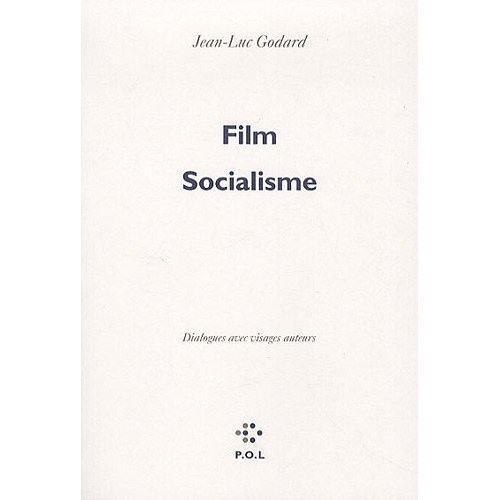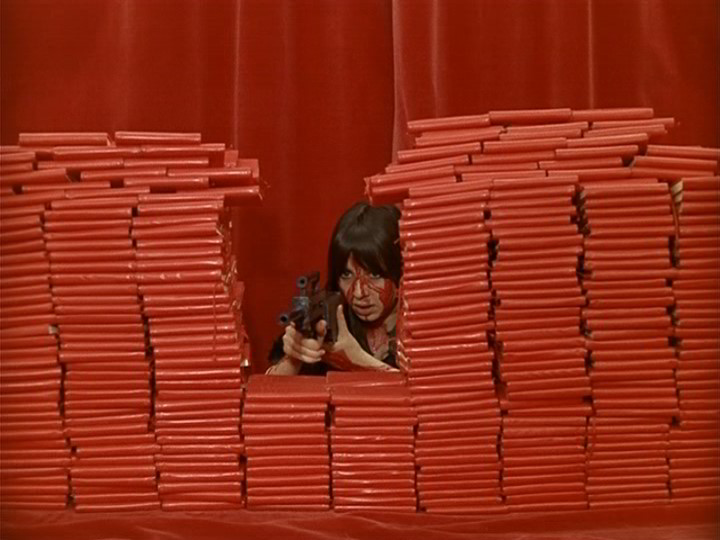Here are two recent valuable acquisitions I’ve made via French Amazon — Antoine de Baecques’s 940-page biography of Jean-Luc Godard, the first one in French (after two in English, by Colin MacCabe and Richard Brody), published by Bernard Grasset, and Godard’s 107-page “book” version of (or companion to) his recent Film Socialisme, published by P.O.L, his usual publisher, and subtitled Dialogues avec visages auteurs (literally, “Dialogues with faces authors”).
It’s far too early to make any sweeping judgments about either book — which would be presumptuous for me to attempt to do at any point, given my less than perfect French — but a few first impressions are in order. De Baecque’s biography is full of interesting details, in particular ones drawn from formerly unavailable or unfamiliar documents, e.g., a letter from Pasolini to Godard about La chinoise, and, roughly two decades later, a letter from Godard to Norman Mailer about some of his plans for King Lear. But it also appears that De Baecque can’t be trusted very much when it comes to his handling of American criticism about Godard. A minor complaint (which I hope doesn’t sound churlish, given how flattering he is to me elsewhere in this book): he claims, based on the French translation of my autobiographical Moving Places, that I spent “half my time in Paris between 1966 and 1968” seeing or reseeing Godard films on drugs; but in fact, apart from a couple of summer visits to Paris during this period (during which my Godard viewing goes unmentioned), my extended sojourn in Paris was between 1969 and 1974, and my accounts of watching Alphaville on grass and Band of Outsiders on acid on the pages he cites were actually in New York in 1965 and in London in 1970, respectively.
Far more serious is de Baecque’s groundless claim that Pauline Kael, in her 1966 essay “Movie Brutalists,” attacked Godard’s “genre” films (for de Baecque, these are Breathless, Le petit soldat, and Band of Outsiders) while defending Godard’s socially-minded films (for de Baecque, these are The Married Woman, Masculine Feminine, and Vivre sa vie). But anyone familiar with Kael’s Godard criticism knows that she supported Breathless, loved Godard’s films about youth (especially Band of Outsiders, Masculine Feminine, and La chinoise), and dismissed Vivre sa vie, The Married Woman, and Alphaville, among others. Like de Baecque’s implication that John Simon — who probably has hated Godard’s work more than anyone else on the planet — was one of his most passionate defenders during the mid-60s, this suggests that de Baecque’s reading knowledge of English simply isn’t up to taking on these kinds of critical surveys.
Godard’s book, on the other hand, probably raises as many questions about Film Socialisme as it answers. Like his other P.O.L books, it often reduces the verbiage of his film to Chinese-fortune-cookie-like epigrams. It’s also important to note that the passages in the film’s soundtrack in German, Italian, Russian, English, and Persian (or is it Arabic?) remain in those languages here, and that the book concludes with a reproduction of a nine-page, handwritten letter in French from philosopher Jean-Paul Curnier to Godard, with three separate passages crossed out, dated 9 novembre 2009. But perhaps the most striking thing here, accounting for the book’s subtitle, is the method of attributing quotations: not by name but by mug shots — among those that I recognize, photographs of Hannah Arendt, Patti Smith, Jean-Paul Sartre, Neal Gabler, William Faulkner (accorded, if I’m not mistaken, two separate photographs and two separate quotations), William Shakespeare, Samuel Beckett, Billy Wilder, and Walter Benjamin. [7/7/10]





